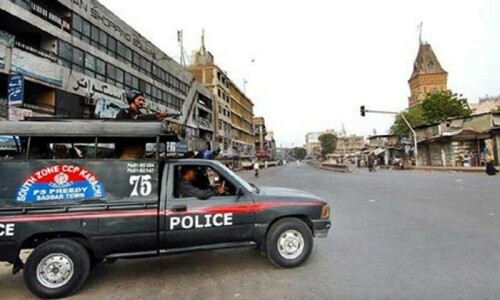BARBARA D. Metcalf in her article ‘Reflections on Iqbal’s Mosque’ says that “most studies of Iqbal take for granted the fact that Iqbal is a poet and do not analyse his skill as a craftsman and artist”. She thinks that Iqbal’s poem ‘The Mosque of Cordoba’ (Masjid-i-Qurtuba) is structured and crafted in such a skilful way and has such rhymes, metaphors and diction that “Iqbal in this poem not only celebrates a mosque, but, literally, builds in the verse a ‘mosque’ of his own”. Muhammad Hasan Askari had remarked that Iqbal’s “poem Masjid-i-Qurtuba is Urdu poetry’s Taj Mahal”.
We realise what great injustice we have done to Allama Iqbal when we read such remarks. We always emphasise Iqbal’s philosophy, his political ideas and the role he played in the creation of Pakistan.
True, he was a thinker who philosophised the concept of Pakistan in his 1930 Allahabad address and stressed in his poetry on a distinct Muslim identity that was to form the base for the idea of Pakistan. But he was a poet first and foremost. Technically perfect, aesthetically mesmerising and philosophically moving, Iqbal’s poetry is no doubt among the best examples of the best of Urdu poetry. With its aesthetic grandeur and majestic diction, at times it sounds prophetic and makes your soul swing with ecstasy. But we have nearly ignored this aspect of Iqbal’s poetry. The aesthetic, poetic and linguistic beauty of Iqbal’s poetry is almost always overshadowed by his image of a ‘philosopher’ and ‘creator of Pakistan’ despite the fact that Iqbal’s aesthetics and poetics form an integral part of his philosophy and message. It is essentially the poetics and aesthetics that render Iqbal’s poetry all the more effective and influential, intermingling thought with feelings through figurative language, as is with all great poetry.
But not much has been written on Iqbal as a poet alone. When we compare the huge body of literature expounding Iqbal’s philosophy and thought with the writings eulogising his literary and poetic merits, we are disappointed. Iqbal, undoubtedly one of the greatest poets of Urdu and Persian, uses figurative language to evoke certain images and there are some allusions and metaphors that appear recurrently in his Urdu and Persian poetry. Iqbal’s imagery makes you realise how vivacious his imagination is and what vibrant images he paints with words.
Imagery is a kind of visual symbolism. In literary terms, imagery is a means of depicting ideas, objects, actions and feelings with visual images. A writer or poet uses figurative language — similes, metaphors, allusions and hyperbole, for instance — to evoke images that convey a theme in such a way that the readers can visualize it and feel it. Iqbal’s poetry has some recurrent images and allusions that have almost become symbols. These images, symbols, similes, allusions and metaphors are an integral part of Iqbal’s poetry and evoke certain physical senses. Most of Iqbal’s imagery concerns the sense of sight, hearing or smell. Rarely, if ever, he talks of touch. That is the reason we never find in Iqbal’s poetry thoughts related to physique or pursuit of sensual pleasure.
Some of Iqbal’s poems or couplets create such imagery that the reader is stunned. The artistic lure of Iqbal’s poetry can be measured from the fact that the great artist Sadequain was much inspired by Iqbal’s imagery and he painted a series of works visualising Iqbal’s thought on canvas.
Aslam Kamal is another Pakistani painter who is inspired by Iqbal. He has been painting the themes of Iqbal’s poetry on canvas for the last 40 years. On the occasion of Iqbal’s centennial in 1977, Aslam Kamal organised an exhibition of his paintings based on Iqbal’s poetry. Since then he has been promoting Iqbal’s poetry through his art all over the world.
The National Book Foundation has published a book titled Kalam-i-Iqbal, naqsh-i-Kamal. The artistically produced book has over 100 paintings and calligraphic art by Aslam Kamal, expounding Iqbal’s thought and capturing his imagery. Dr Inamul Haq Javed in his introduction to the book says that this book is a tribute to Iqbal aimed at spreading his message across the borders.
The book reminds us that Iqbal was a poet too and his poetic artistry can inspire even artists.
Published in Dawn, April 24th, 2017














































Dear visitor, the comments section is undergoing an overhaul and will return soon.